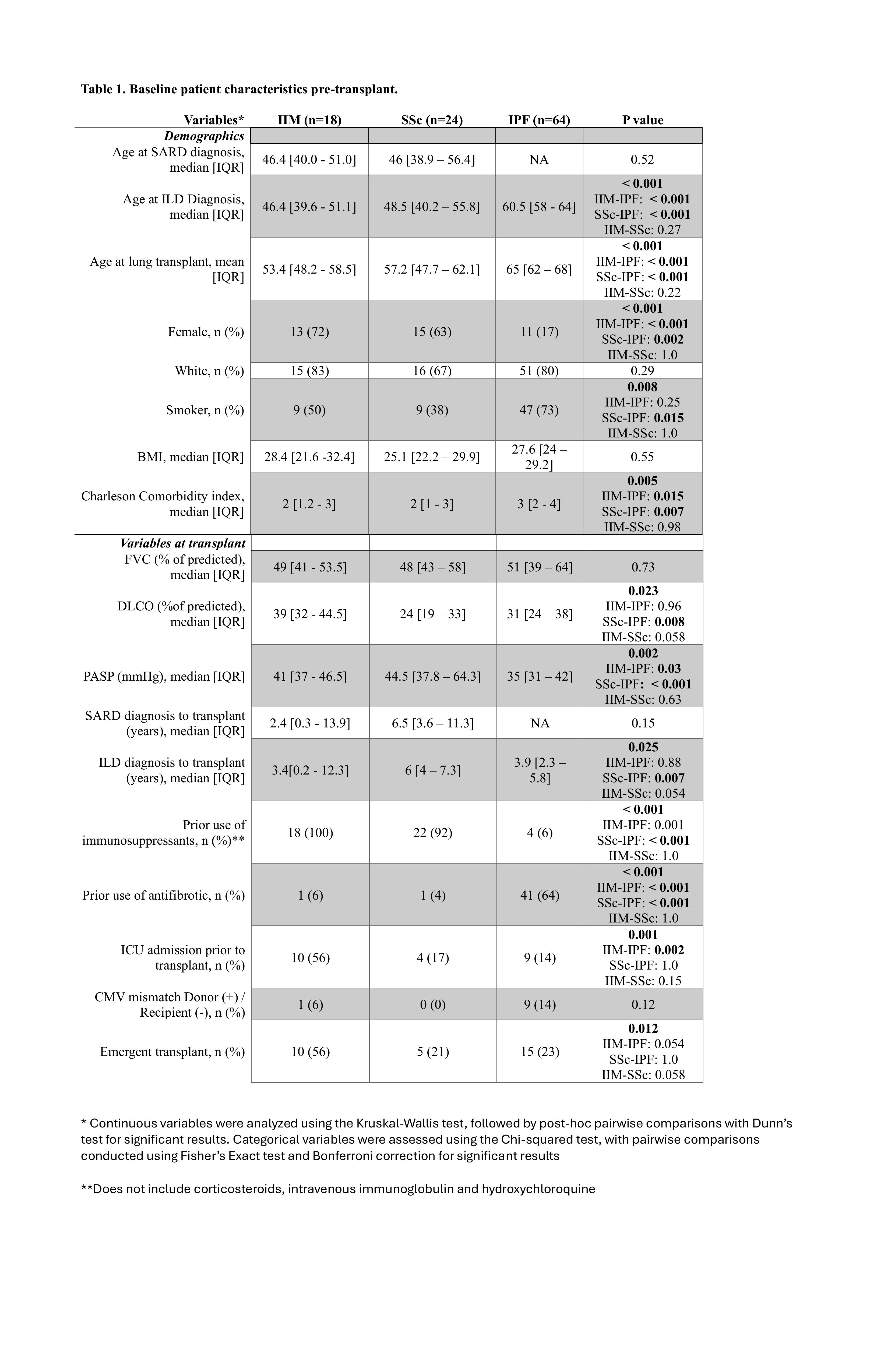Session Information
Date: Monday, October 27, 2025
Title: (1191–1220) Muscle Biology, Myositis & Myopathies – Basic & Clinical Science Poster II
Session Type: Poster Session B
Session Time: 10:30AM-12:30PM
Background/Purpose: Interstitial lung disease (ILD) is a frequent complication of idiopathic inflammatory myositis (IIM) and systemic sclerosis (SSc), ranging from subclinical ILD to rapidly progressive respiratory failure. Despite advancing immunosuppressive and antifibrotic therapies, many progress to end-stage respiratory failure and may require lung transplantation. Unlike idiopathic pulmonary fibrosis (IPF), data on lung transplant outcomes for IIM and SSc patients remain limited. The aim of this study was to compare clinical characteristics and lung transplant outcomes in patients with IIM and SSc to IPF.
Methods: We retrospectively analyzed clinical data collected in patients with ILD diagnosed with IIM, SSc, and IPF who underwent bilateral lung transplant between January 1, 2014 and April 30, 2024 at the Vancouver General Hospital, and between January 1, 2012 and December 31, 2024 at the Centre hospitalier de l’Université de Montréal. All IIM and SSc patients satisfied their respective ACR classification criteria. Univariate analyses were performed for continuous and categorical data. Survival was assessed with Kaplan-Meier analysis, and incidence of chronic lung allograft dysfunction (CLAD) and malignancy were assessed with Poisson regression.
Results: We included 18 IIM, 24 SSc, and 64 IPF patients. Among IIM patients, 50% were anti-melanoma differentiation-associated protein 5 (MDA5) positive, 39% had anti-synthetase syndrome, and 50% had anti-Ro52. Among SSc patients, anti-Scl-70 was found in 33%, anti-centromere in 4.2%, and anti-RNA polymerase III in 4.2%. Patients with IIM and SSc were younger at the time of ILD diagnosis and lung transplantation, more likely to be female, less likely to have a smoking history, and had fewer comorbidities than IPF patients (Table 1). SSc patients had significantly lower diffusing capacity for carbon monoxide (DLCO) and longer ILD duration before transplant than IIM and IPF patients (Table 1). Usual interstitial pneumonia (UIP) was predominant in IPF explant pathology, and nonspecific interstitial pneumonia (NSIP) was predominant in IIM and SSc (Table 2).IIM patients had higher rates of urgent transplant, intensive care unit (ICU) admission, and prolonged post-transplant ICU/hospital stays (Table 2). At 1-year follow-up, forced vital capacity (FVC) was significantly lower in IIM and SSc patients compared to IPF. SSc patients had a significantly higher rate of non-pulmonary infections requiring hospitalization. Over long-term follow-up, all groups shared comparable post-transplant survival (Figure 1), rejection, pulmonary infection, and malignancy rates.
Conclusion: This study is the first to compare short- and long-term lung transplant outcomes from a combined cohort of IIM, SSc, and IPF patients. IIM patients required more urgent transplants and prolonged ICU stays, and SSc patients experienced higher rates of non-pulmonary infections. However, long-term post-transplant survival and complication rates were comparable across all groups. These findings suggest that lung transplantation remains a viable option for carefully selected IIM and SSc patients with advanced ILD, despite their distinct clinical challenges.
 Table 1. Baseline patient characteristics pre-transplant.
Table 1. Baseline patient characteristics pre-transplant.
.jpg) Table 2. Short- and long-term post-lung transplant outcomes
Table 2. Short- and long-term post-lung transplant outcomes
.jpg) Figure 1. Kaplan Meier survival curve for IIM, SSc and IPF patients.
Figure 1. Kaplan Meier survival curve for IIM, SSc and IPF patients.
To cite this abstract in AMA style:
Chang A, Saleh N, Yu A, S. Jalaledin D, Hoa S, Levy R, Wilson J, Poirier C, Yee J, Choi J, Landon-Cardinal O, Kim H, Huang K. Lung Transplant Outcomes in Patients with Myositis- and Systemic Sclerosis-Associated Interstitial Lung Disease Compared to Idiopathic Pulmonary Fibrosis: A Multicentric Retrospective Analysis [abstract]. Arthritis Rheumatol. 2025; 77 (suppl 9). https://acrabstracts.org/abstract/lung-transplant-outcomes-in-patients-with-myositis-and-systemic-sclerosis-associated-interstitial-lung-disease-compared-to-idiopathic-pulmonary-fibrosis-a-multicentric-retrospective-analysis/. Accessed .« Back to ACR Convergence 2025
ACR Meeting Abstracts - https://acrabstracts.org/abstract/lung-transplant-outcomes-in-patients-with-myositis-and-systemic-sclerosis-associated-interstitial-lung-disease-compared-to-idiopathic-pulmonary-fibrosis-a-multicentric-retrospective-analysis/
